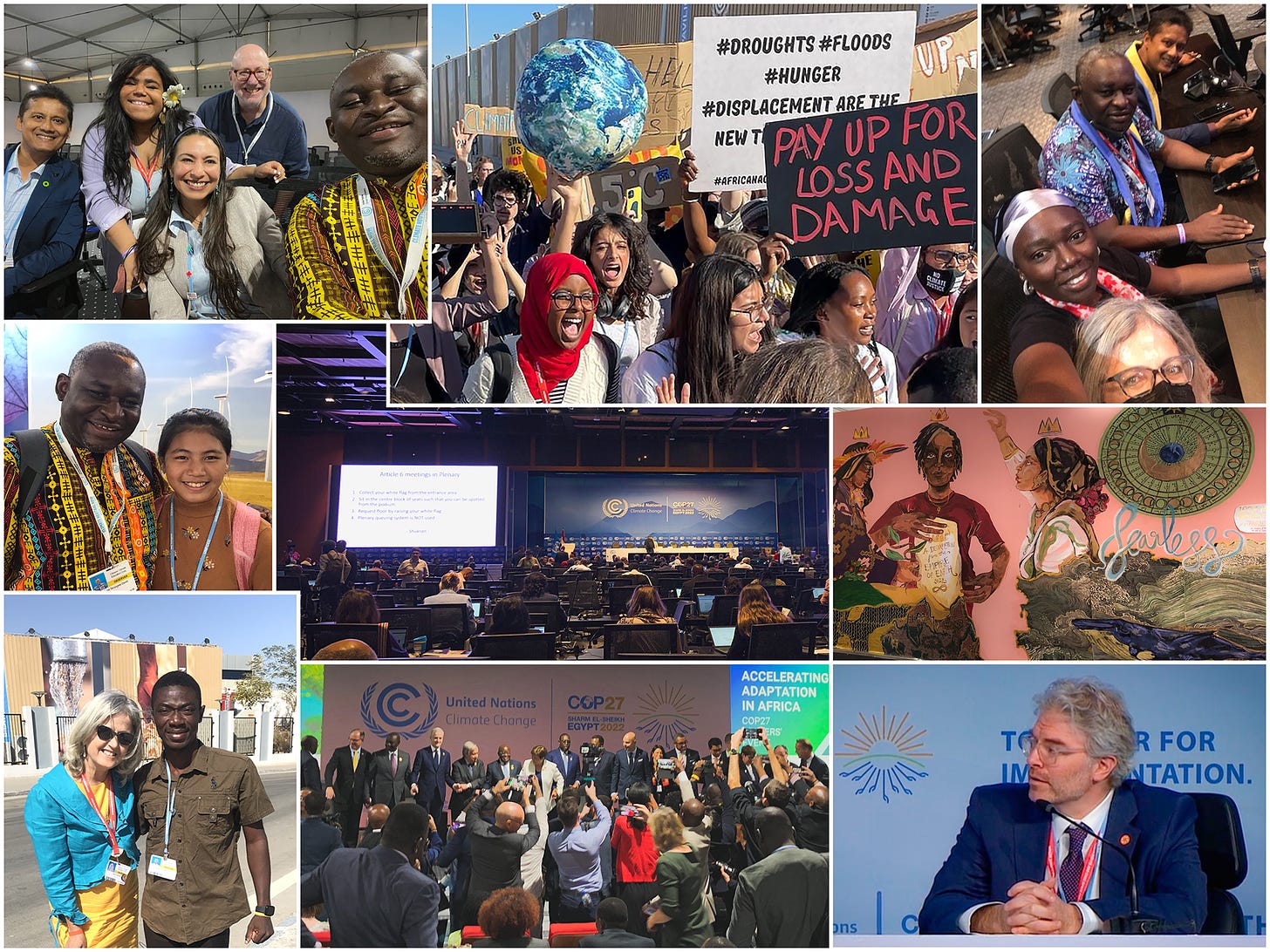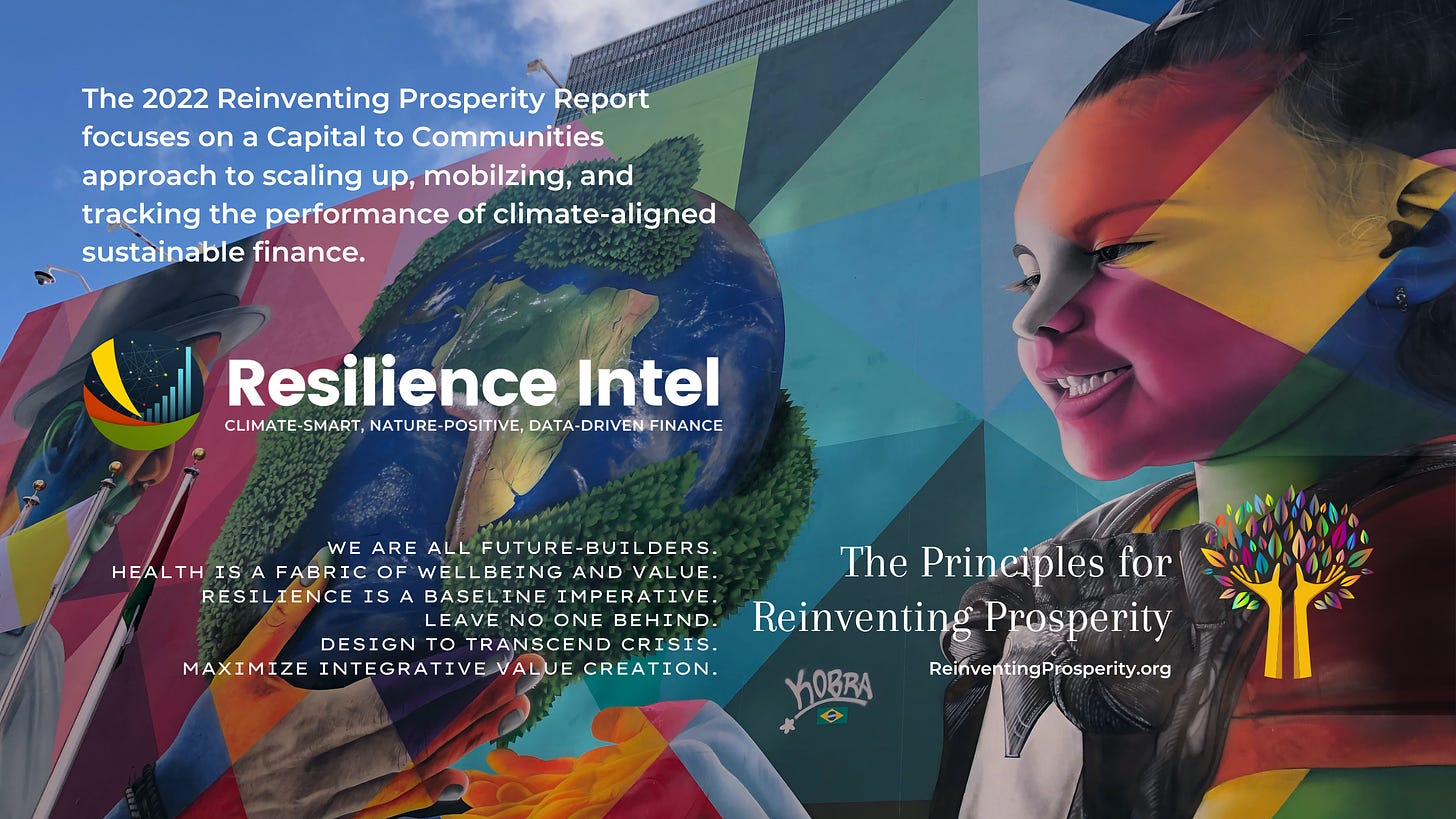Solidarity can solve human-caused crises
NEWSLETTER, November 2022—COP27 report; stakeholders in 71 countries send letters to G20; Livable Future consultation launches; Capital to Communities report values stakeholder participation...
Global crises are colliding, compounding their effects, and setting off ripple effects in communities across the world. Hundreds of millions of people are facing additional hardships, as a result of worsening risks in food, energy, and financial systems. The COP27 U.N. Climate Change negotiations made progress on funding to overcome loss and damage, on global consensus for the reform of financial institutions, on the human right to a clean, healthy environment, and on food systems as critical levers for food security. To succeed in this time of crisis, we will need stakeholder insight-driven policy and investment action to become mainstream practice.
COP27: Outcomes, our work & the way forward
CCI delegates, team members, and allies, engaged with negotiators and with coalitions focused on action in all of our areas of focus: civics, incentives, finance, food, and nature. We highlight here some of the critical outcomes, and link below to our more detailed report.
Loss and damage: In Sharm el-Sheikh, nearly 200 nations agreed to create a Fund to address climate-related loss and damage. The design process and initial resource mobilization will be coordinated by a Transitional Committee with 10 developed country representatives and 14 developing country representatives. A key part of the Committee’s work in 2023 will be facilitating or advising the scaling up of funds from existing institutions and response mechanisms.
Financial reform: The Sharm el-Sheikh Implementation Plan—the formal COP27 outcome agreement—also calls for comphrensive operational reform of multilateral development banks (MDBs) and international financial institutions (IFIs). The projected reforms are needed to better account for vulnerability and related spending needs, uneven climate risk, and the foundational value of mitigation, adaptation, and resilience measures.
New spaces to drive change: We saw an unprecedented recognition throughout the negotiating process of the need to address systemic crises with systemic transformation.
Food systems received unprecedented attention and were linked to food security in outcome documents and in closed, high-level meetings;
The value of robust, ongoing stakeholder engagement was highlighted in the Global Stocktake dialogues, negotiations around agriculture, and in relation to financial delivery and performance tracking;
The COP27 produced a diversified and expanded list of potential areas of focus for non-market cooperative climate action.
The People’s Pavilion: During this year’s U.N. Climate Change negotiations, The People’s Pavilion made more than 500 events accessible to an online community of 400, with more than 4,500 interactions, and near round-the-clock engagement. A smartphone app made it possible to engage from anywhere with a wireless internet signal. This community is now a go-to model for ongoing stakeholder engagement, and will remain active through 2023.
Our delegation: Our team included 22 people on the ground either using Citizens’ Climate badges or coordinating directly with us; our wider network of allies included another 14 close collaborators, and 10 more team members providing remote support. Our team personally joined events and meetings involving more than 25 ministers and heads of state, and engaged effectively with negotiators and senior U.N. leaders.
For our full report on the COP27 formal outcomes, click below:
Stakeholders in 71 countries ask G20 leaders to make finance climate-smart
Citizens' Climate International volunteers and allies sent 1,140 letters from 71 countries to the G20 leaders. The letter asked for the redirection of financial flows that included:
Impose a windfall tax on fossil fuel companies;
Redirect all harmful subsidies towards an equitable and resilient future;
Follow the lead of Aotearoa (New Zealand) and require financial institutions to disclose climate risks;
Enact carbon pricing policies that return revenues back to households on an equal per capita basis. This will have an added benefit of reducing income inequality while cutting GHGs
Many thanks to all the citizen volunteer leaders and allies across the planet.
CCI launches a year-long global consultation on Priorities for a Livable Future
To support enhanced citizen participation and stakeholder insights feeding into the Global Stocktake, the wider UNFCCC process, and the 2024 United Nations Summit of the Future, CCI is launching a global consultation on Priorities for a Livable Future. The online form for contributing your ideas went live on Monday, November 28, and we will hold the first global hybrid consultation event on Tuesday, January 24, 2023.
Click here to add your voice to the consultation directly.
To learn how you can host or join a local event, go to ctzn.earth/livable.
2022 Reinventing Prosperity Report highlights value of stakeholder engagement
The 2022 Reinventing Prosperity Report centers the economic empowerment and agency of people in community and calls for participatory strategies to decentralize and accelerate the deployment of climate-smart finance. Key areas of insight for enhanced mobilization of resources include an emphasis on decentralization of value creation, prioritization and protection of human rights, and an active capital to communities approach to investing in climate resilient development.
The Capital to Communities report also highlights the importance of expanding ‘good food finance’, supporting data systems integration and co-investment strategies, and mainstreaming investment in adaptation and resilience measures. It also highlights the importance of ‘non-market’ cooperative approaches to overall mitigation of global emissions and climate impacts, as invited by Article 6.8 of the Paris Agreement.
Upcoming events
Monthly Informational Calls
Next call: Wednesday, December 21, 2022
To join CCI monthly informational calls, register here.
CCI check-in on COP27 outcomes
Friday, December 2, 2022
Review of Non-Market Approaches under Article 6.8 of the Paris Agreement
Monday, December 12, 2022
Livable Future Global Hybrid Consultation Event
Tuesday, January 24, 2023
As we approach the in-person segment of the 15th Convention on Biological Diversity (CBD) conference in Montreal, let’s look for ways to honor this critical insight:
In December, and during the CBD15 United Nations biodiversity conference in Montreal, we will share more information about linkages between the health of nature and human security and wellbeing.
To read this Newsletter as a PDF, click below:









